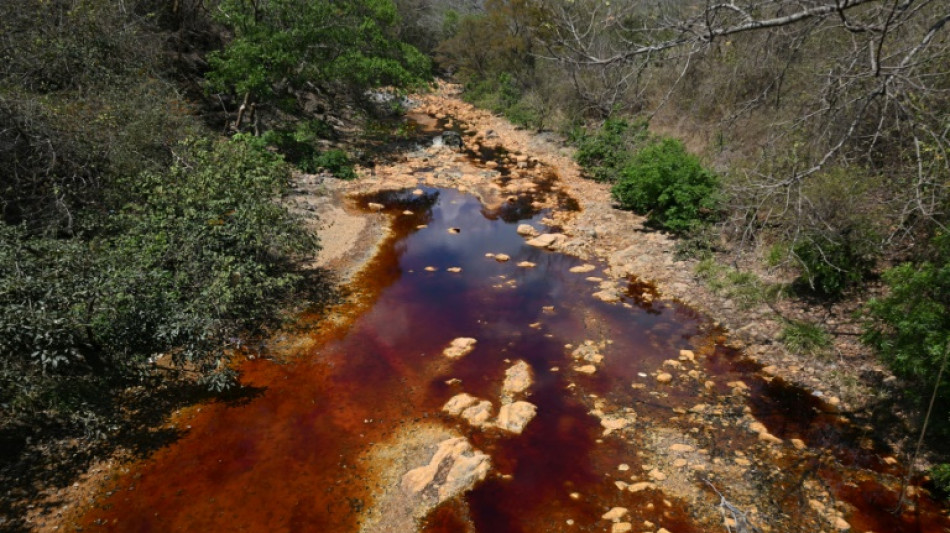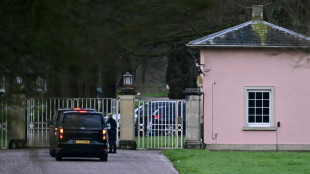
-
 Trump vows 10% global tariff after stinging court rebuke
Trump vows 10% global tariff after stinging court rebuke
-
Aston Martin in disarray as Leclerc tops F1 testing timesheets

-
 Venus Williams accepts Indian Wells wild card
Venus Williams accepts Indian Wells wild card
-
Anxious Venezuelans seek clarity on new amnesty law

-
 Last-gasp Canada edge Finland to reach Olympic men's ice hockey final
Last-gasp Canada edge Finland to reach Olympic men's ice hockey final
-
Scotland captain Tuipulotu grateful for Wales boss Tandy's influence

-
 Zelensky says no 'family day' in rare personal interview to AFP
Zelensky says no 'family day' in rare personal interview to AFP
-
Zelensky tells AFP that Ukraine is not losing the war

-
 Sweden to play Switzerland in Olympic women's curling final
Sweden to play Switzerland in Olympic women's curling final
-
Counting the cost: Minnesota reels after anti-migrant 'occupation'

-
 UK police probe Andrew's protection as royals reel from ex-prince's arrest
UK police probe Andrew's protection as royals reel from ex-prince's arrest
-
Doris says Ireland must pile pressure on England rising star Pollock

-
 US military assets in the Middle East
US military assets in the Middle East
-
Neymar hints at possible retirement after World Cup

-
 Stocks rise after court ruling against US tariffs
Stocks rise after court ruling against US tariffs
-
Australia end dismal T20 World Cup by thrashing Oman

-
 Olympics chief says Milan-Cortina has set new path for Games
Olympics chief says Milan-Cortina has set new path for Games
-
Russian SVR spy agency took over Wagner 'influence' ops in Africa: report

-
 Pegula fights back to sink Anisimova and reach Dubai final
Pegula fights back to sink Anisimova and reach Dubai final
-
Trump administration denounces 'terrorism' in France after activist's killing

-
 Colombia's Medellin builds mega-prison inspired by El Salvador's CECOT
Colombia's Medellin builds mega-prison inspired by El Salvador's CECOT
-
German broadcaster recalls correspondent over AI-generated images

-
 US Supreme Court strikes down swath of Trump global tariffs
US Supreme Court strikes down swath of Trump global tariffs
-
England's Itoje says managing 'emotional turmoil' key to 100 cap landmark

-
 Trump says weighing strike on Iran as Tehran says draft deal coming soon
Trump says weighing strike on Iran as Tehran says draft deal coming soon
-
Tudor is '100 percent' certain of saving Spurs from relegation

-
 Azam dropped for scoring too slowly, says Pakistan coach Hesson
Azam dropped for scoring too slowly, says Pakistan coach Hesson
-
Stocks volatile after soft US growth data, court ruling against tariffs

-
 Italy bring back Capuozzo for France Six Nations trip
Italy bring back Capuozzo for France Six Nations trip
-
From Malinin's collapse to Liu's triumph: Top Olympic figure skating moments

-
 Arteta urges Arsenal to 'write own destiny' after title wobble
Arteta urges Arsenal to 'write own destiny' after title wobble
-
Ukraine Paralympics team to boycott opening ceremony over Russian flag decision

-
 Wales captain Lake wants fans to bring 'noise' against Scotland
Wales captain Lake wants fans to bring 'noise' against Scotland
-
Skier Vonn's Italian hospital a hotbed of men, sister says

-
 India target S.Africa top order, Abhishek to come good: bowling coach
India target S.Africa top order, Abhishek to come good: bowling coach
-
Carrick praises Man Utd 'diversity' after Ratcliffe's immigrant rant

-
 I never thought it would be hit, says 'Scream' creator 30 years later
I never thought it would be hit, says 'Scream' creator 30 years later
-
AI summit statement delayed to 'maximise' signatories: India

-
 Barcelona's Sagrada Familia basilica hits peak height
Barcelona's Sagrada Familia basilica hits peak height
-
Milan sprints to second straight UAE stage win as Tiberi keeps lead

-
 US GDP growth misses expectations as Trump blames shutdown
US GDP growth misses expectations as Trump blames shutdown
-
Benfica investigate video of fans' monkey gestures

-
 French minister pledges tight security at rally for killed activist
French minister pledges tight security at rally for killed activist
-
Guardiola 'couldn't care less' about Arsenal stumble in title race

-
 UK police search property as royals reel from Andrew's arrest
UK police search property as royals reel from Andrew's arrest
-
Germany's Merz to visit China next week

-
 Kompany says Mourinho made 'huge mistake' in Vinicius racism row
Kompany says Mourinho made 'huge mistake' in Vinicius racism row
-
X appeals EU's 120-mn-euro fine over digital content violations

-
 Galthie recalls hulking locks Flament, Meafou for Italy
Galthie recalls hulking locks Flament, Meafou for Italy
-
Turkey, Saudi sign major solar power deal


In El Salvador, a river without fish feeds fear of mining
El Salvador's San Sebastian river has no fish. The runoff from a gold mine upstream, already shuttered two decades ago, has long killed them all.
Now, residents fear the same fate for other rivers -- and the creatures and people depending on them -- after Congress, at President Nayib Bukele's request, reversed a ban on metal mining.
Bukele billed the move as a way of invigorating the Central American country's stagnant economy, but environmentalists and river-side communities fear the potential harms far outweigh any benefits.
In the community of Santa Rosa de Lima, a two-hour drive from the capital San Salvador, wastewater still flows directly into the San Sebastian river from a nearby hill where a gold mine operated for 100 years until 2006.
The site is still being illegally exploited by artisanal gold miners.
On a recent expedition to survey the river with a group of environmentalists, community leader Graciela Funes took a sample of the water and shook her head as she examined its unnatural copper color.
"We cannot allow this situation... We are human and we all need this vital liquid," the 67-year-old told AFP.
In 2016, a report by El Salvador's human rights ombudsman found that runoff from Santa Rosa de Lima's shuttered mine had "severely impacted the quality and availability" of water in the region.
People who relied directly on the river had no option but to buy bottled water for drinking and cooking, it said.
The report contributed to El Salvador becoming the first country in the world, in 2017, to outlaw metal mining due to the harmful effects of chemicals such as cyanide and mercury used in the extraction process.
- 'Pollution, poverty' -
Last December, the mining ban was overturned after Bukele claimed El Salvador, a country of 6.6 million people, had "potentially" the largest gold deposits per square kilometer in the world.
The president mentioned a study -- written by unknown authors and which he did not share -- which found that mining a mere four percent of the country's gold deposits would bring in $131 billion.
This was equivalent to 380 percent of GDP, the president argued, and would "change the economy of El Salvador overnight."
But activists point to the San Sebastian gold mine -- one of the most productive in Central America for much of the 20th century -- as a cautionary tale.
The mine was shuttered after US firm Commerce Group had its environmental license revoked over river pollution.
"The beneficiaries of mining here will be small groups of companies, whether national or transnational, powerful groups that will take the minerals and resources from our soil and leave behind... misfortune, pollution, poverty," said anti-mining activist Vidalina Morales, who joined Funes and others for the San Sebastian river analysis.
Environmental defenders fear a return to metal extraction also threatens the Lempa river, which runs through several areas with mining potential and supplies water to 70 percent of the capital's inhabitants.
While mining does have its supporters, including from Salvadorans who see it as a source of much-needed employment, others worry it could be a dangerous environmental gamble with paltry gains.
For economist Julia Martinez, it is hard to weigh the risks as "we do not see a study that explains if that gold really exists."
And Ricardo Navarro of the Salvadoran Center for Appropriate Technology, an environmental NGO, said gold in the country was found in small concentrations of one gram per ton of rock: "much damage for little gold."
A.Mahlangu--AMWN


